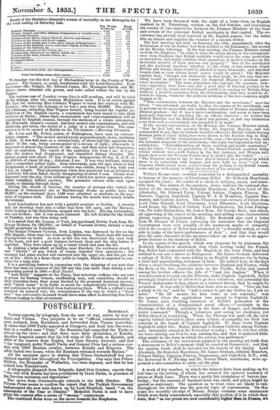Willis's Rooms were crowded yesterday by a distinguished assembly in
honour of the memory of Lieutenant Bellot. Sir Roderick Murchison- occupied the chair ; the centre of a circle of military, naval, and scien- tific men. The names of the speakers, alone, indicate the national cha- racter of the meeting—Sir Roderick Murchison, the First Lord of the Admiralty, Sir Edward Parry, Colonel Sahine, Captain Fitzroy, Mr. Barrow, Captain Inglefield, Captain W. A. B. Hamilton, Captain Om- maney, and Captain Austen. The Chairman read extracts of letters from Lord John Russell, Lord Clarendon, Lord Ellesmere, Lord Aberdeen, Lord Rosse, the Bishop of Oxford, Lord Malmesbury, Sir John Peking- ton, Sir John Richardson, Sir James Ross, Sir George Back, and others, all approving of the object of the meeting, and adding some characteristic phrase respecting Lieutenant Bellot. Sir Roderick also read a letter from M. Drouyn de Lhuys, conveying the assurance that the Imperial Government were very sensible of the numerous marks of sympathy which the memory of Bellot had awakened in "a friendly nation, so well able to judge of the brave performance of duty" ; and that they would give the same character to the measures taken on their side to do appro- priate honour to the memory of Bella. In the course of his speech, which was eloquent by its plainness, Sir Roderick Murchison mentioned, that while serving under the French flag, Bella had cooperated with the English in the river Plate, and had assisted to cut out a slaver in Madagascar. Sir James Graham delivered a eulogy of Bellot, the more telling to an English audience for its being a close and unpretending statement of facts. He related how, in the days when a cloud overhung the relations between England and France, while the fleets of the two countries were in the Pacific, Bellot had earned among his brother officers the title of " rami des Anglais." 'When it was determined to send out the Phoenix, under Captain Inglefield, Ballot pressingly implored to be allowed to go as a volunteer, and persuaded the French Ambassador to beg, almost as a national favour, that ho might be permitted. It was told to Bellot that there was no room. "Give me but a plank to lie on," said he, "and a corner to put my clothes in ; I ask no more." "By all means let him come. as our comrade," was the answer when the application was passed to Captain Inglefield. Sir James gave touching instances of Debt's possession of the characteristics of a distinguished naval officer,—" assiduity in the discharge of his duties, gallantry in the hour of danger, and obedience under command." Though a volunteer, and owing no obedience, yet Bellot obeyed in everything. When the Phcenix was paid c4 the crew eagerly rushed forward to place some tribute of sympathy for their lost comrade in the bands of Captain Inglefield. To these traits Captain Inglefield added this : Ballot, although a Roman Catholic among Protest- ants invariably attended the Protestant worship; "for he felt that while we were adoring our God he was adoring his, and that it mattered little what might be the form in which the service was performed." The substance of the resolutions adopted by the meeting set forth that a monument to Bellot's memory shall be erected at Greenwich ; and that the surplus funds shall be invested for the benefit of his family. Lord Aberdeen, Sir Roderick Murchison, Sir James Graham, Admiral Beaufort., Colonel Sabine, Captains Fitzroy, Ommanney, and Inglefield, R.N., with the Reverend G. C. Nicolay and Dr. Norton Shaw, secretaries, were ap- pointed a sub-committee to carry out the plan.


























 Previous page
Previous page